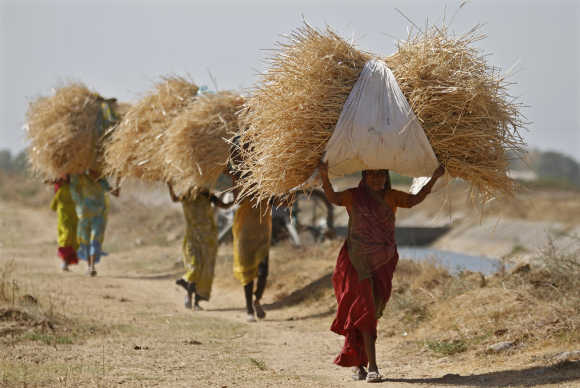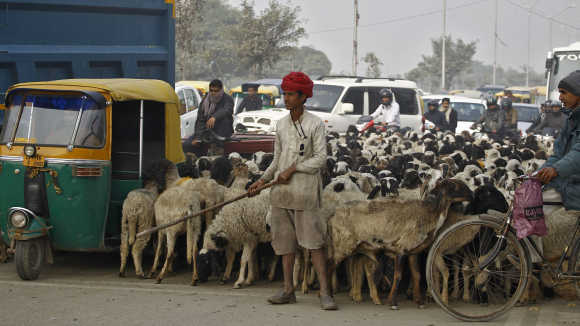 | « Back to article | Print this article |
'Auction land instead of compensating farmers'
Top-down approach in determining compensation is very problematic, and the new bill hasn't changed it fundamentally, say two academics.
Parikshit Ghosh, Associate Professor at Delhi School of Economics, and Maitreesh Ghatak, Professor of Economics at London School of Economics, say the auction method they have suggested will give the farmer significant benefits that the new land bill doesn't.
The farmers themselves should decide how much compensation is enough for them, not the government, they tell Faisal Kidwai in an emailed interview.
Here are the excerpts:
You have said that there's not much of a difference between the new land acquisition bill and Land Acquisition Act of 1894. So, in your view, which are the major problem areas in the new bill?
We have to be careful here. Take the issue of compensation amount. The 1894 Act says compensation should be at market price, the new bill says four times the market price. Obviously they are quite different in this aspect.
However, both impose the amount of compensation from above, and deny the landowners any say in the matter. In this, they are very similar.
The top-down approach in determining compensation is very problematic, and the new bill hasn't changed it fundamentally (though it is more generous with amounts).
In many areas, the current market price is already several times what it was three years ago. How do we know four times (calculated on the basis of transactions in the last three years) will be enough? How do we know officials won't be bribed into fudging land records and under-reporting the market price? What do you do about the problem that in India, "official" land prices are much lower than actual prices because of all the black money involved?
The auction method we have suggested will give the farmer two significant benefits that the new land bill doesn't - he can be compensated with land, not money, and if he gets compensation in cash, the amount will be at least as much as his own asking price.
Click NEXT to read more...
'Auction land instead of compensating farmers'
The bill wants to compensate farmers for their land, but you don't think that's a workable solution. Why is that?
Well, nobody disputes farmers have to be compensated adequately for the land they give up. The question is: how much compensation is adequate, who should decide that, and how? We differ on these points, not on the general principle that farmers' interests have to be protected. The farmers themselves should decide how much compensation is enough for them, not the government. Compensation determined through a land auction will make sure of this.
Click NEXT to read more...
'Auction land instead of compensating farmers'
Instead of compensation, you have proposed auctioning off land. Could you elaborate how this would work?
It will take too much space to explain the whole thing in detail. We refer you either to our article in the IGC Ideas for India portal or the longer paper published in the Economic and Political Weekly.
In a nutshell, the idea is as follows. Some of the displaced farmers may be heavily dependent on land, while there may be others around them who are more willing to give land for cash. You can improve matters by switching these people. Instead of trying to acquire the area earmarked for the project outright, the government should first try to buy a similar quantity of land in the neighbourhood (some of which may come from the project area, some from outside it). This bulk purchase can be done through an auction.
Now, once the government comes in possession of all this land (through a very non-coercive method), it will have an enormous advantage as it tries to take full possession of the project site. Everyone who still owns land there can now be offered other plots of land close by, drawing from the "land bank" the government has just created through the auction.
This way, those people who are critically dependent on farming won't have to be cut off from their livelihood. All they have to bear is the inconvenience of moving around a bit, and they can be paid a small amount to help them adjust to the new location.
Click NEXT to read more...
'Auction land instead of compensating farmers'
In your research you have cited the example of Reliance's inability to buy land in Maha Mumbai. Why do think a company as big as Reliance failed to acquire land?
Many people say industries should be left to acquire all the land they need from the market. We don't agree with this position, and cited the Reliance case to support our view.
For the amount of land you need to build a factory, power plant or SEZ (special economic zones), you have to strike deals with thousands of people. This is especially true in India, where agricultural land is highly fragmented and most owners own very small plots.
What makes this so tricky is that you have to buy literally every plot that falls in the project zone before you can proceed with the work. If even a single plot remains unsold for some reason (say there is a property dispute over ownership that is dragging on in courts), the whole thing is stalled.
The fact that a company as powerful as Reliance couldn't pull it off should make people who advocate a completely market based solution rethink their position.
Click NEXT to read more...
'Auction land instead of compensating farmers'
Some say with industrialists buying up so much land, agricultural productivity will go down and India will face food shortage because of this. What's your take on this?
We have three responses to this. First, although in absolute terms, industry requires thousands of acres, as a fraction of the agricultural land in the country, it is very small. It will not create a large enough dent in the overall food supply, so the fear is somewhat exaggerated.
The second point is that in the process of economic development anywhere, the agricultural sector shrinks in terms of employment and value added, but that does not lead to food shortages. This is because agricultural productivity also rises with industrialisation.
The third point is more subtle. If you determine compensation through the auction process we have suggested, it should create an automatic brake that will slow down agricultural land conversion as soon food scarcity starts to become a problem. Food scarcity will raise food prices, which will raise land prices, and farmers will start asking for much higher compensation when these land auctions are held. This will make it very costly for industry to acquire land, and you can expect the process to slow down.
If the compensation is fixed by the government, there is no automatic brake. Remember that the base for calculations - market price - is estimated from land transactions going back three years. So, going by the formula suggested in the new bill, the compensation burden will be too slow to react to any emerging food scarcity situation. You have to set up a system that has in-built checks that will be triggered by a crisis.
This is one more reason to adopt the auction method instead of the rigid formula the bill is proposing.




